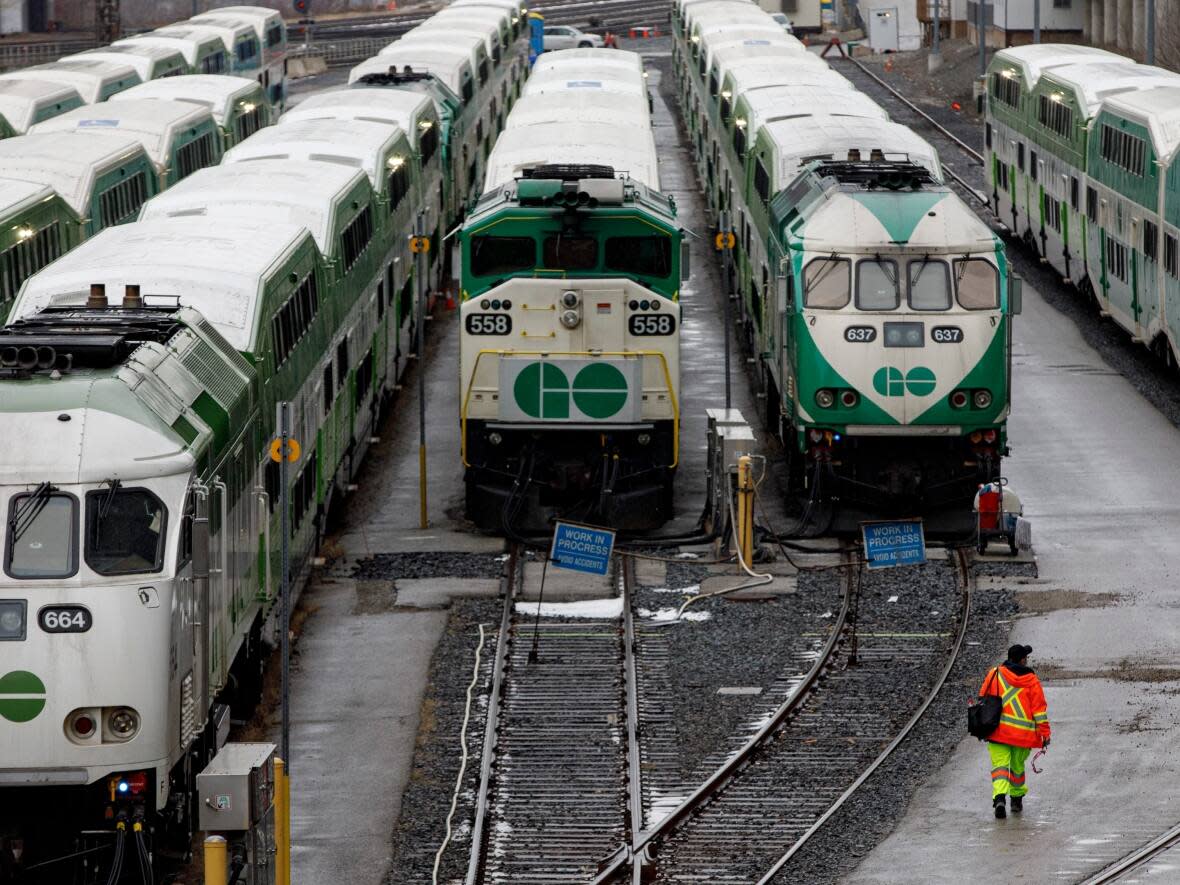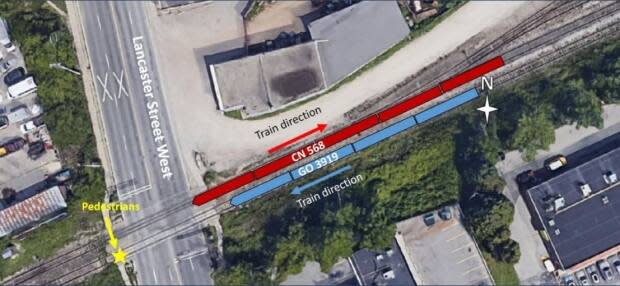Ontario failed to properly oversee railroad safety in 2019 when pregnant mom, 6-year-old hit by train: TSB

A Transportation Safety Board of Canada investigation into an incident involving a GO Transit train that struck and seriously injured a pregnant woman and a six-year-old child in 2019 in Kitchener has found Ontario's Ministry of Transportation doesn't provide effective safety oversight of provincially regulated railways.
In its report released Thursday, the TSB said the ministry has no overall provincial regulatory framework in place, and relies on inspection agreements with Transport Canada (TC) and Metrolinx to aid in complying with federal safety standards. The MTO also doesn't have employees with technical railway knowledge, experience and expertise, the report found.
The findings come over three years after the GO Transit train hit the woman and child at a Kitchener crossing, leaving them critically injured. They were airlifted to a local hospital. The woman was released from hospital in December 2019. The status of the child isn't immediately known.
Metrolinx commuter trains, Via passenger trains and CN freight trains all operate at the crossing, according to the TSB.
The woman and child were struck on tracks owned by Metrolinx, an agency of the Ontario government.
1 million passengers ride GO trains weekly
TSB chair Kathy Fox told CBC News on Thursday that the Ministry of Transportation hadn't been receiving inspection reports from Transport Canada because the ministry doesn't have employees with the background to properly evaluate those reports.
"The [MTO] has the authority to direct Metrolinx through its board of directors to take certain mitigating actions," Fox said.
"But the issue is that if MTO is ... not receiving inspection reports from Transport Canada and don't have the expertise or the people to verify or validate what they're hearing from TC and making sure Metrolinx is taking the appropriate action, then there's a gap in the oversight.
"Therefore, [MTO] cannot provide effective oversight of provincially regulated railways in Ontario," Fox added.
Approximately 337 kilometres of railroad tracks are owned by Metrolinx, which operates GO Transit commuter trains and buses. GO Transit is the regional public transit service for the Greater Toronto and Hamilton areas. Approximately one million passengers ride GO trains every week, according to GO Transit's website.
MTO needs 'proper regulatory frame work'
Fox said while the MTO has the right to outsource inspections to Transport Canada inspectors the ministry can't outsource the responsibility for the safety oversight of its railways.
She said even though Transport Canada inspectors can point out areas of non-compliance or standards, they can't compel Metrolinx to take action because the track is regulated by the MTO.
"Whoever does the inspections, even if it was a third party, MTO is still responsible for effective oversight and to do that, they need a proper regulatory framework with regulations covering safety-related provisions and the ability to take enforcement action if those provisions aren't respected," Fox said.
Since the 2019 incident, the TSB's report says, the MTO has "identified a need to update the oversight framework for urban and regional rail transit that would better support the province's growing rail network and the diversity of operators."
In January 2022, the ministry updated its agreements with Transport Canada and Metrolinx, and worked closely with Transport Canada to strengthen the ministry's accountability role regarding Metrolinx, to "verify that non-compliances and deficiencies that may arise are appropriately addressed."
In an emailed statement to CBC News, an MTO spokesperson said Transportation Minister Caroline Mulroney directed staff to conduct a review to "strengthen and enhance provincial rail safety oversight" prior to the release of TSB's report.
"Actions taken to date include amending the process for how we receive inspection reports, and continuing to work with Metrolinx and municipalities to ensure safety at grade crossings," the spokesperson said.
"As part of our ongoing work, MTO will continue to work closely with its agencies, including Metrolinx and the Ontario Northland Transportation Commission, to ensure the safety of our regulated railways."
CBC reached out to Metrolinx by email but hadn't heard back at time of publication.
Woman and child hit in 2019
On Nov.13, 2019, the 30-year-old pregnant woman and the six-year-old boy from Guelph suffered life-threatening injuries after the GO train, which had been travelling westbound, struck them as they were attempting to walk across the tracks at the Lancaster Street and Victoria Street intersection in Kitchener.

The boy isn't related to the woman. She worked for BitKIDS Behaviour Consulting, a centre that provides autism therapy for children, and he was under her care at the time of the incident.
The intersection is made up of two tracks going eastbound and westbound, and is owned by Metrolinx, according to the report.
Metrolinx officials said staff were notified just before 3 p.m. ET that two people were hit by a GO train coming from Guelph.
The woman was later charged by regional police in December 2019 with failure to "give way to railway equipment at a road crossing."
At the time, the rail crossing had crossing signs, flashing lights, bells and gates. It's also designated as an anti-whistling crossing, meaning trains are not allowed to sound their horns upon approach, the TSB said.
The TSB added there were no pedestrian gates to protect pedestrians or alternate warning devices to alert them of a second train coming at the time of the accident.
The report also found the MTO, CN, Metrolinx and the Region of Waterloo were not aware of the hazards that existed at the Kitchener crossing.

Through its investigation, the TSB found Metrolinx installed two east-facing cameras focusing on the gates in June 2020. Officials reviewed footage taken between June 23 and June 29 during 4 a.m. and 11 p.m., and found the crossing's warning devices were triggered 195 times, of which 129 were done by CN freight trains or switching assignments.
Of those 129 times, during 17 occurrences, vehicles, pedestrians and cyclists were delayed more than five minutes, which goes against Grade Crossing Regulations, said the TSB. On three occasions, delays were longer than 10 minutes, with 18 minutes recorded as the longest delay.
From the review of the footage, Metrolinx also noted pedestrians and cyclists entered the crossing while crossing arms (also called crossing gates) were down almost 25 per cent of time.
Since 2019, Metrolinx has added additional safety measures at the Kitchener rail crossing, as well as more signs warning of a second train.
Metrolinx also reduced the speed for GO trains to pass the crossing, from 48 km/h to 24 km/h, and have instructed crews to sound their horns when a second train is in the vicinity of the crossing.



